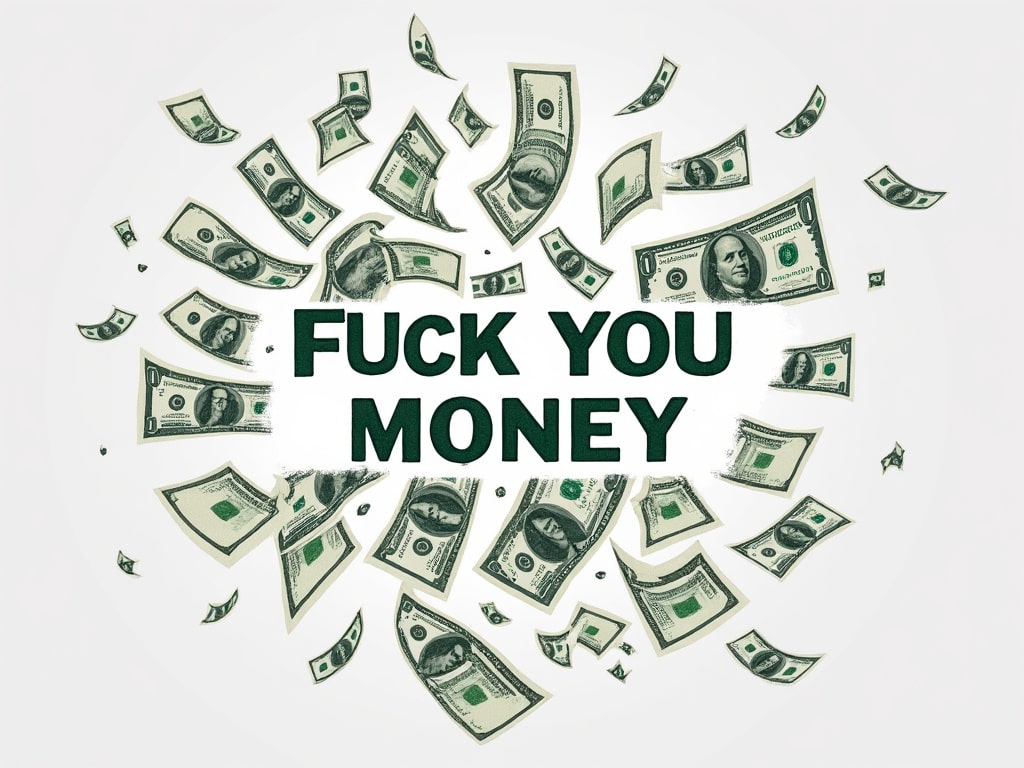
There’s a certain kind of power that comes when you have enough money that you no longer need to abide by the constraints of convention. It’s the point at which your financial security transcends mere comfort and graduates into a potent form of autonomy and influence. This is the realm of what has often been called “Fuck You money”—a phrase as blunt as it is revealing. Beyond its colorful name, Fuck You money represents a rarefied state of existence in which your bank balance provides more than just material luxuries. It grants you the ability to walk away from bad deals, to chart your own course, to speak your mind freely, and to make bold moves that defy expectation. In essence, it is the economic equivalent of personal sovereignty.
Defining “Fuck You Money”
The term “Fuck You money” first found its way into the American lexicon in the late 20th century, bubbling up from the cultural ferment of Hollywood, Wall Street, and Silicon Valley—worlds where fortunes were often made quickly and dramatically. To have Fuck You money means achieving a pinnacle of self-sufficiency. You’re beholden to no corporation, no boss, and no critic whose opinions might otherwise stifle your ambitions. You have outgrown the fear that losing one source of income will send your life into disarray. The essence is freedom—freedom to live on your own terms, freedom to pursue purpose over paychecks, and, above all, freedom to decline any request with complete impunity.
It’s worth emphasizing that Fuck You money isn’t defined by a single static amount. What constitutes Fuck You money for a multi-billionaire differs profoundly from what it means to a modest wage-earner who has socked away enough cash to take a year off between jobs. It’s highly subjective and deeply personal. For some, it may be the yield on a well-managed trust fund, for others a modest but consistent passive income from investment properties, and still others might achieve that confidence with a cryptocurrency wallet—symbolizing newfound digital sovereignty that transcends traditional financial systems.
The Quiet Power of Not Needing Anyone’s Approval
One of the most striking aspects of Fuck You money is the sense of quiet power it confers. Imagine no longer tiptoeing around egomaniacal bosses or toxic workplace politics. Imagine telling a client who makes unreasonable demands, “No,” without worrying about how the next mortgage payment will be made. Fuck You money transforms employment from a necessity into an option, allowing you to choose projects, positions, and even entire industries based on passion rather than desperation.
With Fuck You money, you can take risks that would otherwise seem reckless—because the traditional safety net of a steady paycheck ceases to be a life-or-death matter. If you fail, you can afford to learn from that failure rather than be crushed by it. It’s a kind of enforced authenticity. You are no longer constrained to be anything other than yourself, and that is a form of liberation that few ever experience.
Grand Examples of Fuck You Money in Action
Throughout modern history, we’ve seen extraordinary examples of individuals using their financial independence to orchestrate grand—and sometimes controversial—gestures. One high-profile contemporary case is Elon Musk’s acquisition of Twitter (now X). While the details and motivations are complex, Musk’s purchase was, in many ways, an Fuck You money move on a global stage. Freed by his immense fortune from the norms that corral most CEOs, Musk decided to buy an influential social media platform and reshape it according to his own vision. Whether you laud his entrepreneurial audacity or criticize his methods, it’s hard to deny that such a move is only possible when you have the type of wealth that, quite literally, lets you do as you please.
Consider also the case of professional athletes, top-tier entertainers, or hedge fund managers who, after making fortunes, turn their backs on their original fields to pursue philanthropy, activism, or eccentric hobbies. There’s the musician who tells a record label “no” because they refuse to compromise on their artistic vision; the investor who decides to bail out of a promising deal because it conflicts with their personal ethics; or the magnate who buys massive tracts of land for conservation purposes, indifferent to critics who say it’s unprofitable. Fuck You money can fund private space races, personal theme parks, or maverick political campaigns that spring into existence outside the traditional corridors of power.
Another compelling example lies in the billionaire class funding their own escapades into outer space. Jeff Bezos and Richard Branson didn’t just invest in rockets for profit—they took them for personal joyrides. Such vanity projects might seem frivolous, but they demonstrate the unshackled freedom these individuals possess. One can argue about their moral and ethical dimensions, but on a functional level, they are the pinnacle of “I’ll do what I want” made manifest.
Traditional Wealth vs. Modern Complexity
Of course, amassing conventional wealth typically leads to an intricate web of responsibilities, dependencies, and liabilities. Traditional millionaires and billionaires protect their fortunes through elaborate financial structures—trusts, offshore accounts, shell companies—and spend small fortunes on elite legal counsel. For the ultra-wealthy, wealth management can feel like a never-ending chess game, a high-stakes match played out in boardrooms and courtrooms worldwide. Their fortunes become so complex that “Fuck You” might still be possible, but comes burdened with administrative baggage. The frictionless freedom one might imagine is often weighed down by the practicalities of maintaining, defending, and growing that wealth.
The Rise of Bitcoin as a New Kind of Fuck You Money
In a piece published in Forbes by Jameson Lopp—CTO and co-founder of Casa—he explores the idea that Bitcoin and other cryptocurrencies have introduced a novel paradigm into the world of personal finance and sovereignty. Bitcoin, Lopp argues, is not simply another volatile digital investment. Rather, it offers a method of asset protection previously available only to the elite. By leveraging cryptography and decentralized networks, individuals can hold wealth that resists censorship, confiscation, and arbitrary regulations in ways that traditional fiat currencies and physical assets cannot.
This technological shift lowers the barrier to entry for achieving a level of Fuck You independence. Bitcoin allows ordinary individuals to construct their own “digital banks,” fortified by cryptographic protocols that not even nation-states can easily breach. It’s no longer necessary to pay teams of lawyers and accountants to ensure your wealth remains secure. In the Bitcoin model, defensive asymmetry means it’s more costly to attack the system than it is to defend what you own. You hold the keys—literally. It’s a form of empowerment that levels the playing field, giving regular people a foothold in the sovereignty arena once reserved for the super-rich.
With Bitcoin, someone can create time-locked “vaults,” ensure inheritance directly via multisignature setups, or lock funds away for generations without relying on trust companies or legal jurisdictions. As Lopp points out, Bitcoin allows any sum, however modest, to be transformed into a form of Fuck You money. No gatekeepers, no arbitrary closure of your accounts, no dependency on a banker’s whim. While complexities and learning curves exist, the radical promise is undeniable: financial freedom and sovereignty are now accessible to anyone who cares to learn the ropes.
The Human Element: What Will You Do With Your Freedom?
At its core, Fuck You money isn’t merely about telling off a bad boss or funding quirky projects. It’s about having the freedom to align your actions with your values. When financial chains are lifted, what remains are the principles you hold dear and the goals you want to pursue. Perhaps you’ll become a patron of the arts, a benefactor for environmental initiatives, or an entrepreneur working to solve world hunger. Or maybe you’ll just buy a yacht and sail around the world, discovering yourself along the way. The ethical dimension of this freedom is a personal choice—Fuck You money gives you the capacity to do immense good or indulge in frivolity, to build new institutions or tear down old ones.
The Promise and Paradox of Financial Autonomy
Fuck You money is alluring because it represents an escape from the mundane. It is the endgame for those who believe that true freedom lies at the intersection of wealth and individual will. Yet it also poses questions about responsibility, ethics, and one’s place in society. As new tools like Bitcoin democratize access to forms of wealth sovereignty, the possibility that more people could achieve some level of Fuck You independence grows tantalizingly real. What would our world look like if more people had the capacity to walk away from the systems and power structures that currently hold them in place?
One thing is certain: Fuck You money, whether measured in billions of dollars, slivers of cryptocurrency, or simply a well-rounded portfolio, is ultimately about empowerment. It’s the capacity to say “no” when everyone else must say “yes.” It’s the audacity to be guided by choice rather than constraint. And in a world still largely shaped by hierarchical economic pressures, that kind of freedom can feel like the rarest commodity of all.

